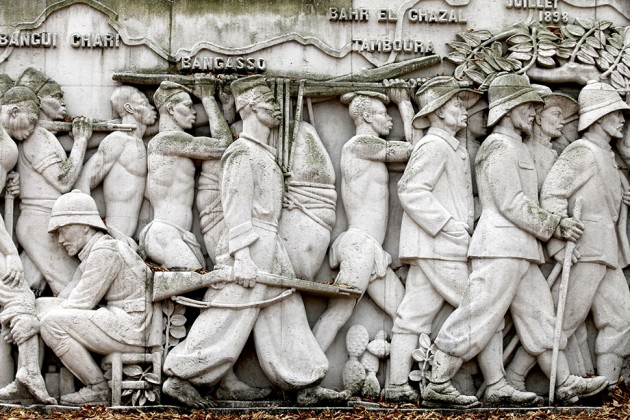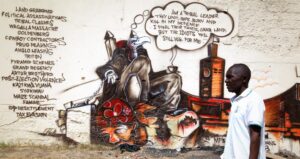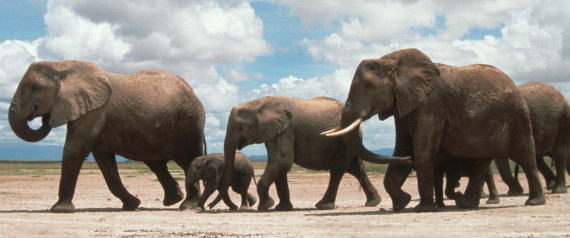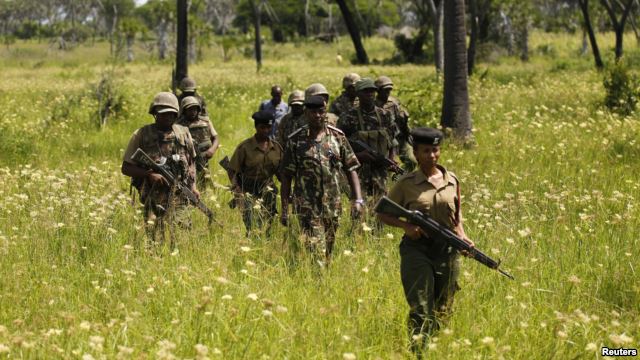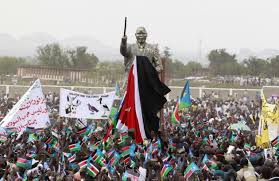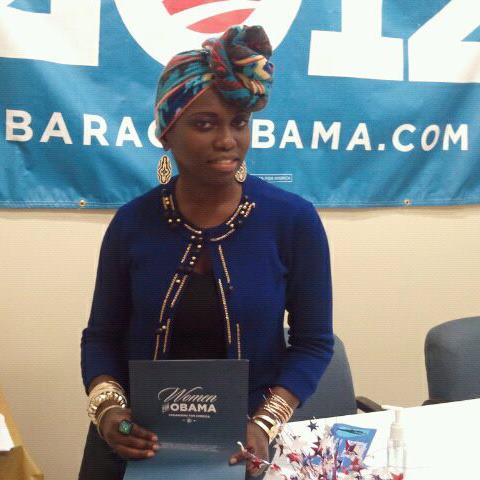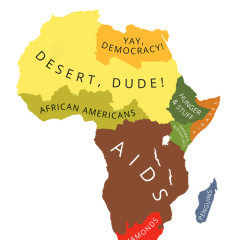The fight against dirty money goes global
June 21, 2014
Patrick Smith*
Trade mispricing, money laundering and tax evasion are stripping more than $50bn a year from African state revenue. So says a detailed, new United
[caption id="attachment_10095" align="alignleft" width="300"] When government appears unconcerned about corruption and illicit financial flows, citizens must find other ways to be heard, as in this striking street art in Nairobi’s central business district. Photo©Thomas Mukoya/Reuter[/caption]
Nations report coordinated by South Africa's Thabo Mbeki.
A s heads of state meet Malabo on 1 July for the African Union (AU) summit, a substantial bombshell is due to drop at the gathering.
It will take the form of a no- holds-barred investigation into the multibillion-dollar losses that state treasuries are suffering across Africa due to what are euphemistically called 'illicit financial flows.'
A detailed research dossier on how these losses are engineered and the damage they do to Africa's development chances, along with some hard-hitting recommendations, will be released at the summit.
The report's authors hope the scale of the losses to African treasuries – $50-100bn a year at a time when the continent is scrabbling for development capital – will prompt serious and practical action from the assembled leaders.
These losses are the ill-gotten gains of grand corruption, criminal fixing of trade prices, tax evasion and money laundering.
The guilty parties – and the beneficiaries-in-chief – are top government officials, politicians and their local business allies, together with multinational corporations and a pin- striped army of account- ants, tax lawyers and company agents.
"A certain elite benefits from this trade mispricing. They inflate prices so they can keep money out- side. This is more or less known, but it's not quantified," says Carlos Lopes, executive secretary of the United Nations (UN) Economic Commission for Africa.
"There is no financial intelligence, even less trade intelligence. When we engage governments with a lot of information on trade negotiations, the lack of knowledge is really patent," Lopes explains.
International lobbying against these costly trade and tax frauds is finally getting results. In 2012, the UN appointed Thabo Mbeki, a former president of South Africa, to head the High-Level Panel on Illicit Financial Flows, supplied with critical research from Lopes's team at the Economic Commission for Africa.
African economies are proportionally hit the hardest by this global phenomenon. Experts such as Alex Cobham at the Washington-based Center for Global Development reckon that Africa's trade losses amount to more than double the foreign aid that the continent's 54 states receive.
Cobham told the Tana High-Level Forum on Security in Africa in April that these trade rackets are eating into state revenue for education and health while also contributing to the criminalisation of the state and undermining security.
"Stronger surveillance of trade terms and customs services coordinated regionally with requirements that multinational companies should report their earnings on a country-by-country basis to prevent profit-shifting could stop the rot quickly," argues Cobham.
The west wakes up
Such policies require great political will, say the researchers on the Mbeki report, although international rules are changing.
Initially reluctant to take the problem seriously, perhaps because some of their biggest companies were benefiting from the scams, Western governments are reining in tax havens such as Guernsey, Jersey and the British Virgin Islands as well as demanding more open exchanges of information about corporate taxation and profit-shifting schemes.
Lopes says he expects a good reception for the report at the AU: "I think those within the leadership who will not like it will keep quiet, but there will be very vocal support for it."
Although the report and recommendations will be detailed, its authors hope it will be worded diplomatically enough to win back- ing from key African leaders.
High up on the list will be proposals for much tougher customs enforcement together with better training of and equipment for customs officials.
In many countries, customs departments have been one of the most protected, opaque and corrupt of state institutions. Changing that will require political determination and much better surveillance technology.
The report will include case studies of massive trade losses in Algeria, the Democratic Republic of Congo, Nigeria, Liberia, Kenya, Mozambique and South Africa. It is likely to urge closer cooperation with the Financial Action Task Force, an international outfit that is leading the charge against money laundering.
A lack of international data on trade pricing in Africa has held back enforcement. Officials from the United States (US) are proposing a system of trade transparency units under which countries could share trade documents and set common standards for statistics.
Many trade scams have been exposed because investigators have had access to the US Department of Commerce's comprehensive database.
The most common form of trade fraud is a scheme for getting money out of a country without paying taxes and duties while evading capital controls.
A typical deal would involve grossly inflated invoices for imports. For example, a Kenyan sports company imports golf clubs that sell for $1,000 in the exporter's market.
But the exporter will sell to an intermediary or shell company that marks up the invoice by 10 or 20 times the market value of the products.
So the shell company will invoice the Kenyan sports company $20,000 for each set of clubs, allowing the companies involved to shift substantial sums of capital outside the country and to declare a trading loss and evade tax.
Undervalued exports
At the same time, exports – especially of minerals and oil car- goes – are often undervalued and quantities are deliberately understated. That reduces the tax burden and disguises the size of the real financial gains.
To facilitate such deals, governments appoint third parties to market their commodities.
These traders buy cheaply from the country of origin and sell to the destination market at the going price. The profits are then shared between the traders and corrupt government officials.
In Nigeria, such trade scams are institutionalised, according to Nuhu Ribadu, the country's former anti-corruption tsar.
"Why does Nigeria need private agents to sell its oil when our state-owned oil company could sell directly to the end user? This is not done in any other oil-producing country in the world," he says.
Not only do such arrangements take revenue from the public coffers, says Ribadu, they promote a criminalisation that fuels violence and instability: "I see links between corruption, stolen money and these insurgencies [...]. They are all the outcome of lawlessness.
"An African proverb says: 'Flies do not land on an egg that is not cracked.' Nigeria is like a cracked egg: it's attracting pretty bad people. It comes down to our inability to protect our resources. They go into the private pockets of individuals, and our institutions are extremely weak," Ribadu explains.
Even when Ribadu headed up the state anti-corruption agency, it made few inroads into the oil sale scams that were costing Nigeria billions of dollars a year.
Diagnosing and identifying the problem of trade fraud is difficult enough. Arresting the perpetrators is tougher still, as they often operate behind a wall of secrecy and shell companies, and they frequently have friends in high places.
As the pace of African economic growth gathers momentum and banks are better regulated, more revenue is lost to this trade-based money laundering. Increasingly, it is a two-way traffic: trade scams are used to smuggle money into as well as out of countries.
Cross-border crooks have become adept at smuggling money into countries to evade tax and capital controls and launder the proceeds of crime.
Over the past decade, hundreds of millions of dollars from drug smuggling have been invested in real estate in Ghana, Sierra Leone, Nigeria and Côte d'Ivoire while officials turned a blind eye.
The UN Office on Drugs and Crime estimates the proceeds from the drugs trade in West Africa at more than $1bn a year, much of which is laundered through the regional economies.
Narco-governments
These investments are quickly converted into rents, producing substantial local surpluses: those revenues can buy political influence and power, creating narco-governments.
Last year US authorities slapped a $102m forfeiture order on a Lebanese bank that had helped finance a complex scheme to sell used cars in West Africa for massive profits that were then transferred to front companies controlled by Hezbollah, the Iranian-backed Islamist militia.
Trade frauds are growing in scope and ambition. The non-governmental organisation Global Financial Integrity (GFI), whose president Raymond Baker sits on Mbeki's UN panel, reckons that almost $1trn flowed illicitly out of poor countries in 2011.
Those funds were made up by the proceeds of drug trafficking, arms smuggling, terrorism and state corruption.
Later this year, GFI will publish an exhaustively researched report showing that there has been a net transfer of capital from developing economies to rich industrial ones for several decades.
In Africa, GFI reported in May that more than $60bn of illicit trade deals took place in just five countries – Ghana, Kenya, Mozam- bique, Tanzania and Uganda – between 2002 and 2011.
Those countries lost about a tenth of their tax receipts to these trade frauds. "This is just the beginning of the conversation surrounding trade misinvoicing and illicit flows in these countries," says Baker.
*theafricareport]]>
When government appears unconcerned about corruption and illicit financial flows, citizens must find other ways to be heard, as in this striking street art in Nairobi’s central business district. Photo©Thomas Mukoya/Reuter[/caption]
Nations report coordinated by South Africa's Thabo Mbeki.
A s heads of state meet Malabo on 1 July for the African Union (AU) summit, a substantial bombshell is due to drop at the gathering.
It will take the form of a no- holds-barred investigation into the multibillion-dollar losses that state treasuries are suffering across Africa due to what are euphemistically called 'illicit financial flows.'
A detailed research dossier on how these losses are engineered and the damage they do to Africa's development chances, along with some hard-hitting recommendations, will be released at the summit.
The report's authors hope the scale of the losses to African treasuries – $50-100bn a year at a time when the continent is scrabbling for development capital – will prompt serious and practical action from the assembled leaders.
These losses are the ill-gotten gains of grand corruption, criminal fixing of trade prices, tax evasion and money laundering.
The guilty parties – and the beneficiaries-in-chief – are top government officials, politicians and their local business allies, together with multinational corporations and a pin- striped army of account- ants, tax lawyers and company agents.
"A certain elite benefits from this trade mispricing. They inflate prices so they can keep money out- side. This is more or less known, but it's not quantified," says Carlos Lopes, executive secretary of the United Nations (UN) Economic Commission for Africa.
"There is no financial intelligence, even less trade intelligence. When we engage governments with a lot of information on trade negotiations, the lack of knowledge is really patent," Lopes explains.
International lobbying against these costly trade and tax frauds is finally getting results. In 2012, the UN appointed Thabo Mbeki, a former president of South Africa, to head the High-Level Panel on Illicit Financial Flows, supplied with critical research from Lopes's team at the Economic Commission for Africa.
African economies are proportionally hit the hardest by this global phenomenon. Experts such as Alex Cobham at the Washington-based Center for Global Development reckon that Africa's trade losses amount to more than double the foreign aid that the continent's 54 states receive.
Cobham told the Tana High-Level Forum on Security in Africa in April that these trade rackets are eating into state revenue for education and health while also contributing to the criminalisation of the state and undermining security.
"Stronger surveillance of trade terms and customs services coordinated regionally with requirements that multinational companies should report their earnings on a country-by-country basis to prevent profit-shifting could stop the rot quickly," argues Cobham.
The west wakes up
Such policies require great political will, say the researchers on the Mbeki report, although international rules are changing.
Initially reluctant to take the problem seriously, perhaps because some of their biggest companies were benefiting from the scams, Western governments are reining in tax havens such as Guernsey, Jersey and the British Virgin Islands as well as demanding more open exchanges of information about corporate taxation and profit-shifting schemes.
Lopes says he expects a good reception for the report at the AU: "I think those within the leadership who will not like it will keep quiet, but there will be very vocal support for it."
Although the report and recommendations will be detailed, its authors hope it will be worded diplomatically enough to win back- ing from key African leaders.
High up on the list will be proposals for much tougher customs enforcement together with better training of and equipment for customs officials.
In many countries, customs departments have been one of the most protected, opaque and corrupt of state institutions. Changing that will require political determination and much better surveillance technology.
The report will include case studies of massive trade losses in Algeria, the Democratic Republic of Congo, Nigeria, Liberia, Kenya, Mozambique and South Africa. It is likely to urge closer cooperation with the Financial Action Task Force, an international outfit that is leading the charge against money laundering.
A lack of international data on trade pricing in Africa has held back enforcement. Officials from the United States (US) are proposing a system of trade transparency units under which countries could share trade documents and set common standards for statistics.
Many trade scams have been exposed because investigators have had access to the US Department of Commerce's comprehensive database.
The most common form of trade fraud is a scheme for getting money out of a country without paying taxes and duties while evading capital controls.
A typical deal would involve grossly inflated invoices for imports. For example, a Kenyan sports company imports golf clubs that sell for $1,000 in the exporter's market.
But the exporter will sell to an intermediary or shell company that marks up the invoice by 10 or 20 times the market value of the products.
So the shell company will invoice the Kenyan sports company $20,000 for each set of clubs, allowing the companies involved to shift substantial sums of capital outside the country and to declare a trading loss and evade tax.
Undervalued exports
At the same time, exports – especially of minerals and oil car- goes – are often undervalued and quantities are deliberately understated. That reduces the tax burden and disguises the size of the real financial gains.
To facilitate such deals, governments appoint third parties to market their commodities.
These traders buy cheaply from the country of origin and sell to the destination market at the going price. The profits are then shared between the traders and corrupt government officials.
In Nigeria, such trade scams are institutionalised, according to Nuhu Ribadu, the country's former anti-corruption tsar.
"Why does Nigeria need private agents to sell its oil when our state-owned oil company could sell directly to the end user? This is not done in any other oil-producing country in the world," he says.
Not only do such arrangements take revenue from the public coffers, says Ribadu, they promote a criminalisation that fuels violence and instability: "I see links between corruption, stolen money and these insurgencies [...]. They are all the outcome of lawlessness.
"An African proverb says: 'Flies do not land on an egg that is not cracked.' Nigeria is like a cracked egg: it's attracting pretty bad people. It comes down to our inability to protect our resources. They go into the private pockets of individuals, and our institutions are extremely weak," Ribadu explains.
Even when Ribadu headed up the state anti-corruption agency, it made few inroads into the oil sale scams that were costing Nigeria billions of dollars a year.
Diagnosing and identifying the problem of trade fraud is difficult enough. Arresting the perpetrators is tougher still, as they often operate behind a wall of secrecy and shell companies, and they frequently have friends in high places.
As the pace of African economic growth gathers momentum and banks are better regulated, more revenue is lost to this trade-based money laundering. Increasingly, it is a two-way traffic: trade scams are used to smuggle money into as well as out of countries.
Cross-border crooks have become adept at smuggling money into countries to evade tax and capital controls and launder the proceeds of crime.
Over the past decade, hundreds of millions of dollars from drug smuggling have been invested in real estate in Ghana, Sierra Leone, Nigeria and Côte d'Ivoire while officials turned a blind eye.
The UN Office on Drugs and Crime estimates the proceeds from the drugs trade in West Africa at more than $1bn a year, much of which is laundered through the regional economies.
Narco-governments
These investments are quickly converted into rents, producing substantial local surpluses: those revenues can buy political influence and power, creating narco-governments.
Last year US authorities slapped a $102m forfeiture order on a Lebanese bank that had helped finance a complex scheme to sell used cars in West Africa for massive profits that were then transferred to front companies controlled by Hezbollah, the Iranian-backed Islamist militia.
Trade frauds are growing in scope and ambition. The non-governmental organisation Global Financial Integrity (GFI), whose president Raymond Baker sits on Mbeki's UN panel, reckons that almost $1trn flowed illicitly out of poor countries in 2011.
Those funds were made up by the proceeds of drug trafficking, arms smuggling, terrorism and state corruption.
Later this year, GFI will publish an exhaustively researched report showing that there has been a net transfer of capital from developing economies to rich industrial ones for several decades.
In Africa, GFI reported in May that more than $60bn of illicit trade deals took place in just five countries – Ghana, Kenya, Mozam- bique, Tanzania and Uganda – between 2002 and 2011.
Those countries lost about a tenth of their tax receipts to these trade frauds. "This is just the beginning of the conversation surrounding trade misinvoicing and illicit flows in these countries," says Baker.
*theafricareport]]>

